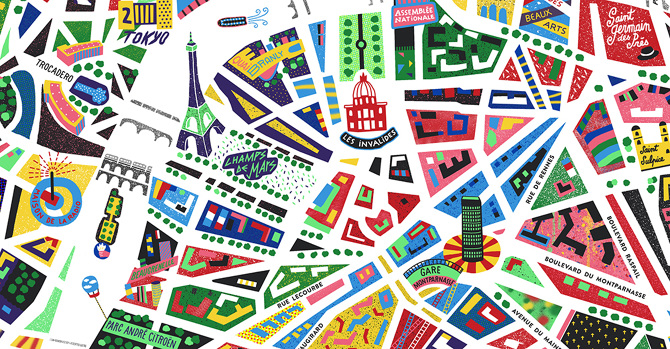Course Descriptions
Paris Courses - Spring 2020
174. (Un)Veiling the Republic: France in the Muslim World and the Muslim World in France
While Charles Martel is said to have heroically “saved” France from invading Muslims in 732, today, France has the highest percentage of Muslims in Europe. This interdisciplinary course draws from the fields of history, political science, sociology, and international studies to examine the fraught relations between France and the Muslim world over the centuries. The class will be broken up into two sections. In the first section, it will look at France’s historical presence in the Arab world and the consequent Muslim presence in France. In the second section, it will focus on French society today and evaluate the socio-political integration process of French Muslims. Topics covered include colonization and decolonization, Islamic heritage and its clash with the French secularizing mission, and political policies on Muslims in France such as the heated issue over the veil. Students will investigate these topics from a variety of sources, ranging from historical documents and cultural criticism to journalistic and cinematic expressions. 4.5 UC quarter units. Suggested subject areas for this course: History/Political Science/Sociology
176. Cinema in a Global City
177. Documenting the Periphery: Identity & Citizenship in the "Other" Part of Paris
This interdisciplinary course will examine the socioeconomic and political disenfranchisement experienced by residents of the "other France" – a France comprised of working-class citizens often of immigrant origin and from France’s former colonies. It will introduce students to urban sociology by requiring that they focus on the particular problems experienced by social actors who live in economically and socially disfavored parts of Paris. Topics covered include urban sociological theories, de-facto segregation, poverty, crime, schooling, public policy, national identity, the negotiation of bi-culturality, and the French secularizing mission. Students will investigate these topics from a variety of sources, ranging from documentary film and photojournalism to literary and cinematic expressions. Via these sources, they will become familiar with a vibrant urban "vernacular" culture that contests issues pertaining to citizenship, racialization and representation. 4.5 UC quarter units. Suggested subject areas for this course: Urban Studies/Sociology/Comparative Literature
179. Food in a Global City: Food Cultures and Food Politics
This course explores the intersection between food cultures and food politics, with an eye towards arguments and debates that have animated French culinary culture. How is food a portal for studying the changing dynamics of cities, global systems, and national identity? In what ways has food been employed to construct notions of community and belonging? Through discussions of interdisciplinary course readings, reporting and writing assignments, and excursions around the city of Paris, we will consider how food structures our identities, everyday practices, and political lives. 4.5 UC quarter units. Suggested subject areas to which this course transfers over: Anthropology/Sociology
80. City and Language Quarter Program
Christina von Koehler, Claudia Fontu, and Fredrik Rönnbäck
Paris, the most visited city in the world, is both an historical city and a modern global capital that fashionably wears the old and the new on its sleeve. It is also home to Parisians, whose clichéd image has been shaped in cultural imaginaries from around the globe, but whose identities and cultures are increasingly plural. The city and language course poses this two-fold question: just who is this city for, and how does one unlock its levels? More than a picturesque concentration of streets and buildings, Paris’s urban landscape provides a tableau upon which people have inscribed meaning, message, and significance to state, nation, and culture. To decipher these messages and gain an understanding of Paris’s history and the French culture that has shaped it, we will look at the histories of the conception, construction, and public perception of Parisian sites and place their stories within the larger context of the development of French identity.
The city and language course introduces students to French history, culture, and language through team-taught instruction. In the “Pursuing Paris” sessions, you will learn about French history and culture by visiting sites important to the evolution of the capital city—these sessions will be taught in English. In the “Unlocking French” sessions, you will learn targeted language skills through situational communication, so you will have the opportunity to use everything you learn as you go about your daily activities. 3.0 UC quarter units. Suggested subject areas for this course: French/History/Urban Studies
81. City and Language Semester Programs
Christina von Koehler and Claudia Fontu
Paris, the most visited city in the world, is both an historical city and a modern global capital that fashionably wears the old and the new on its sleeve. It is also home to Parisians, whose clichéd image has been shaped in cultural imaginaries from around the globe, but whose identities and cultures are increasingly plural. The city and language course poses this two-fold question: just who is this city for, and how does one unlock its levels? More than a picturesque concentration of streets and buildings, Paris’s urban landscape provides a tableau upon which people have inscribed meaning, message, and significance to state, nation, and culture. To decipher these messages and gain an understanding of Paris’s history and the French culture that has shaped it, we will look at the histories of the conception, construction, and public perception of Parisian sites and place their stories within the larger context of the development of French identity.
The city and language course introduces students to French history, culture, and language through team-taught instruction. In the “Pursuing Paris” sessions, you will learn about French history and culture by visiting sites important to the evolution of the capital city—these sessions will be taught in English. In the “Unlocking French” sessions, you will learn targeted language skills through situational communication, so you will have the opportunity to use everything you learn as you go about your daily activities. 6.0 UC quarter units. Suggested subject areas for this course: French/History/Urban Studies
